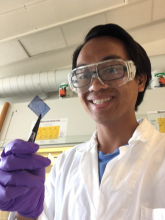
University:
Major:
Site Abroad:
Mentor(s):
Faculty Sponsor(s):
Project Title:
Project Description:
Doping of semiconducting polymers increases their electrical conductivity which is required for use as thermoelectric material, with potential application in areas including waste heat recovery and thermoelectric temperature control. However, the effectiveness of a dopant and polymer pair varies based on the interactions between the dopant, polymer, and solvent. Thus, it is vital to test various dopant and polymer pairs to maximize the electrical conductivity of various polymers. In this project, two conjugated polymers, the polythiophene p(g42T-T) and polythienothiophene p(g42T-TT), are doped with 2,3,5,6-tetrafluoro-7,7,8,8-tetracyanoquinodimethane (F4TCNQ), 2,3-dichloro-5,6-dicyano-1,4-benzoquinone (DDQ), tetracyanoquinodimethane (TCNQ), and tetracyanoethylene (TCNE). A 1:1 chloroform:acetonitrile (CH3CN:CHCl3) solvent mixture is used to ensure polymer and dopant solubility. Addition of dopant effectively increases the electrical conductivities of the polymers up to a dopant concentrations 40 mol% before reaching a maximum conductivity of around 80 S cm-1. Increasing the doping level also affects absorption spectra for the polymer by decreasing the polymer absorption along with increasing features of present charged dopants molecules. The tested dopant and polymer pairs have thus proven capable for use as thermoelectric materials.
